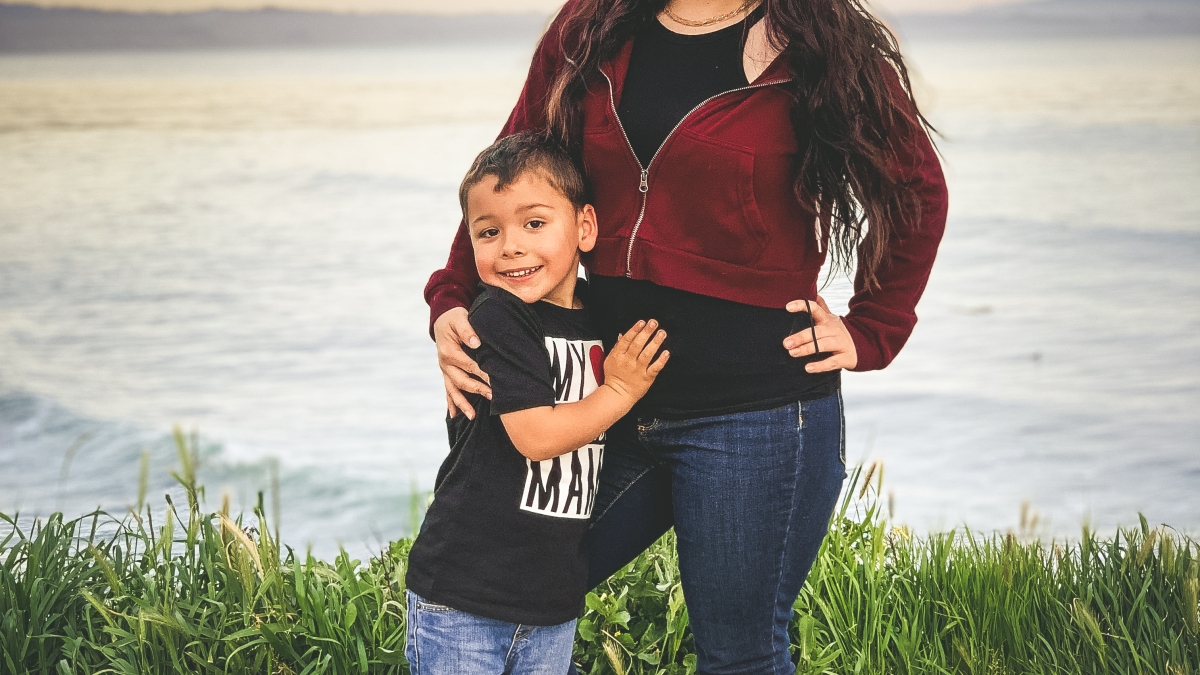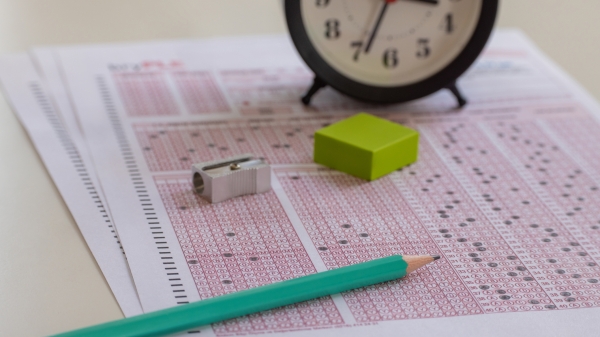Graduate aims to set example for son, help community through social work career

Lena Bonds and her son, Gabriel.
Editor’s note: This is part of a series of profiles for spring 2019 commencement.
“I think it’s really important that anyone that has gone through any kind of adversity, to use that as a fuel to go and help others,” said Lena Bonds, an online student in The College of Liberal Arts and Sciences. “Get out, and once you get out, you should turn around and help others that are still engulfed in those flames.”
Bonds, who is graduating with her bachelor’s degree from the T. Denny Sanford School of Social and Family Dynamics in May, is the first in her family to graduate from high school, obtain an associate degree and is soon to become the first to receive a bachelor’s degree, with sights set on a master’s degree next. And she has accomplished each step while raising her son, Gabriel.
Bonds said her son, now 5, was a driving force for her to return to school.
“To be able to provide that stability for my son by myself and show him how important education is and how important it is to continue with your goals and keep bettering yourself no matter what’s going on around you is extremely important to me. That’s why I initially went back to school, I was just planning to get my associate but it’s just blossoming into now getting my master’s.”
When Bonds was set to begin her journey at The College, she was in the process of exiting an abusive relationship.
“I thought about it for a minute wondering if I should postpone my entrance to Arizona State but I just took a leap,” she said.
That leap paid off, as Bonds said she experienced a wealth of support and assistance — both financially and emotionally.
“The professors were always working with me. When I was in the middle of leaving, I was a couple of days late and they would gladly give me an extension and even after the extension, they’d check up and make sure that my son and I were safe,” she said.
Bonds said she not only enjoyed the online experience, but that it was crucial to her future success.
“I would have never been able to obtain my bachelor’s degree without having a fully online program,” she said.
Question: What was your “aha” moment, when you realized you wanted to study the field you majored in?
Answer: I was going to be a lactation consultant because I was already in the medical field (as a pediatric assistant). To be a lactation consultant, it was required to take a child development class and that class just changed me. It made me realize I didn't want to be in the medical field, I wanted to work more hands-on with children and families that are at-need and at-risk of entering into either the CPS system or the juvenile delinquency system and that class (at Glendale Community College) just changed everything. I took a leap of faith, applied to ASU and started in fall 2017.
Q: What’s something you learned while at ASU — in the classroom or otherwise — that surprised you, that changed your perspective?
A: The most changing class of my perspective would be The Sociology of Deviance with Dr. Carlsen-Landy. You just look at so many things on how you think either you’re different or this person is different — either negatively or positively — but then you see how the norms are constructed and different sociological perspectives on how norms are constructed and why some people are made to feel like they are different and how it benefits different people.
Q: Which professor taught you the most important lesson while at ASU?
A: Dr. Carlsen-Landy, I love her. I am TAing for her both sessions this semester. She has taught me how to mentor students; in social work it’s a lot about mentoring and helping these families and young children and adolescents so I find that to be an invaluable resource. And Professor Duryea in Stress Management Tools II. That class came to me at the perfect time — when I was going through everything — and it was an invaluable way to learn about stress management. Her feedback and encouragement, learning that you just have to let things go, how to meditate and focus on what you can control ... it was such a great class. I think everyone should take it.
Q: What’s the best piece of advice you’d give to those still in school?
A: No matter what is going on in life, prioritize school. Definitely prioritize family, but prioritize school even if you have to scale it back a couple of classes to get through some personal issues. Do not quit school. I almost thought about it and I’m so glad I pushed through, you learn so many lessons as you’re pushing through as well and you get it done. If you stop for a little while, it’s so hard to restart; if this is a dream or purpose or something you’ve been wanting to accomplish, you can do it.
Q: What are your plans after graduation?
A: I’ve already spoken with graduate admissions, they require 240 hours of social service work before you can apply. I’m finishing up my hours of social service work and then I’ll be applying for my Master of Social Work at ASU. My ultimate goal is to help others that went through similar situations as me but working with more youth, so at-risk-youth and their families and helping them either prevent recidivism or help and prevent before they go into the system.
Q: If someone gave you $40 million to solve one problem on our planet, what would you tackle?
A: I would tackle the foster system. Growing up I had an uncle that went into the foster system, I almost went into the foster system but ended up with my dad — my mom was an addict and was abusive. I have seen the system from when I was a child up until now and there are so many issues with the foster system.
Q: What advice do you have for individuals considering returning to school but unsure of how to make it happen?
A: Think outside the box. There’s always a way to make it happen, it may require a lot of sacrifice and simplicity in your life — I had to scale back, I was without a car for two years and I sold almost everything I had — but just stick to what your purpose, your priority, your goal is. And reach out to ASU. It’s amazing how many different scholarships and grants are offered to you.
More Sun Devil community

Tested tips for taking exams
With May quickly approaching, many students are starting to prep for their most important tests of the year — final exams.Toni…

School of Transborder Studies celebrates 15th anniversary
During the summer before his freshman year at Arizona State University, Salvador Macias participated in the AGUILA Youth…

Barrett program unlocks study abroad for first-year honors students
Twenty first-year students from Barrett, The Honors College at Arizona State University are spending their second semester…

